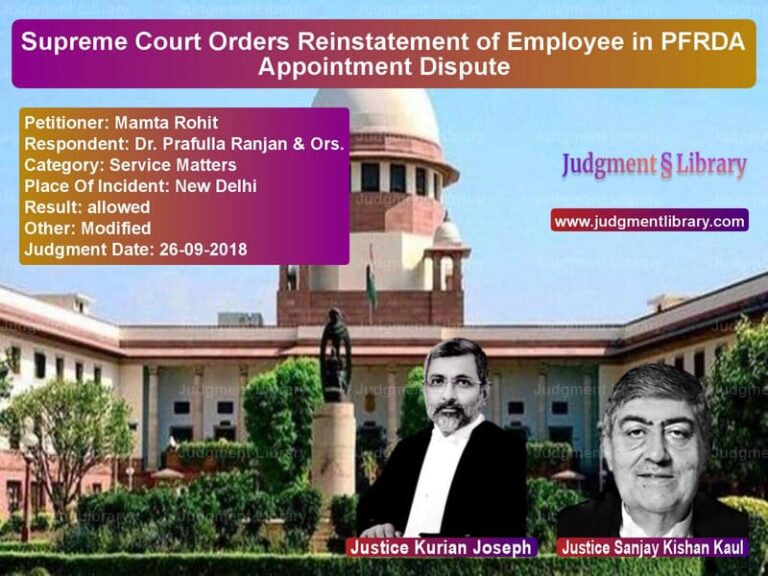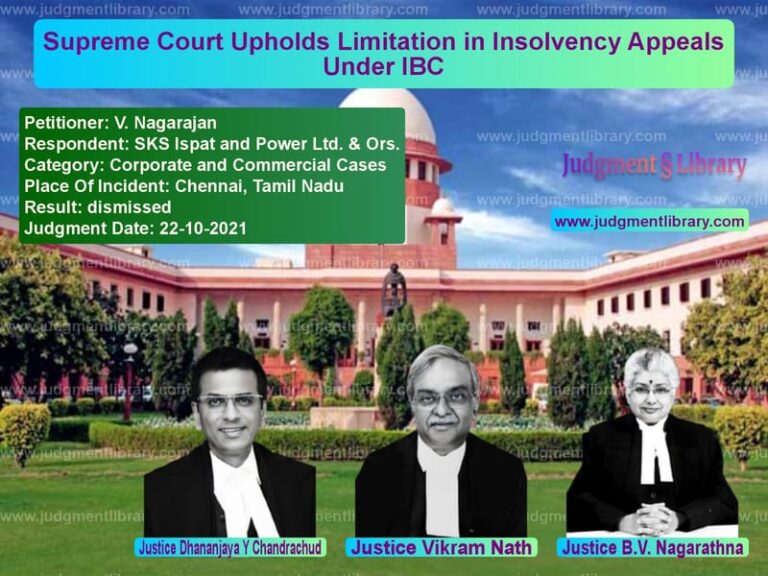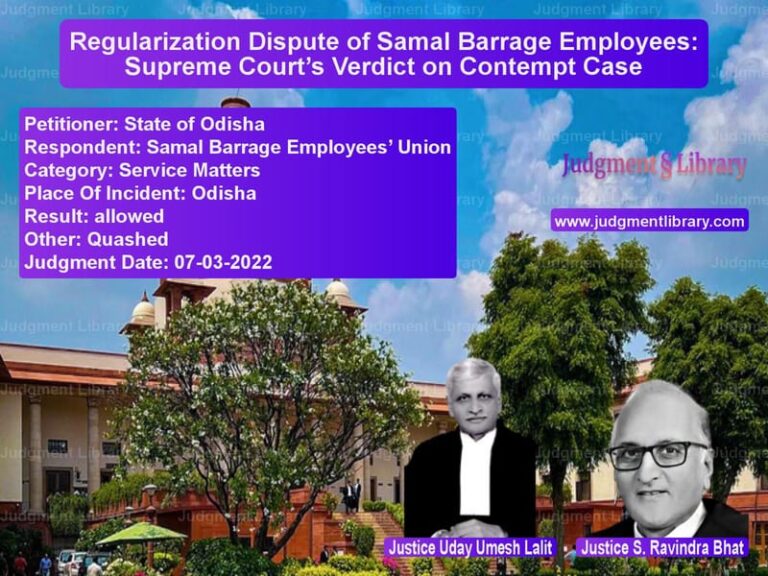Demonetization and Judicial Scrutiny: Supreme Court Upholds Currency Ban
The case of Vivek Narayan Sharma vs. Union of India is one of the most significant legal challenges concerning economic policy in India. This case revolved around the constitutional validity of the demonetization of ₹500 and ₹1000 currency notes announced by the Government of India on 8th November 2016. The Supreme Court had to examine whether the government’s move adhered to constitutional principles, whether it followed proper legal procedures, and whether it infringed upon fundamental rights.
Background of the Case
The demonetization of ₹500 and ₹1000 notes, which constituted over 86% of the total currency in circulation, was undertaken with the stated objective of curbing black money, counterfeit currency, and terrorist financing. The move created widespread economic disruption, leading to hardship for ordinary citizens and businesses. This prompted multiple petitions before the Supreme Court, challenging the legality of the government’s decision.
The petitioners, led by prominent lawyers, argued that the decision was taken arbitrarily, lacked proper consultation, and violated the fundamental rights of citizens. On the other hand, the government defended its move as a necessary step in the larger interest of the economy, asserting that it was implemented after due consideration and consultation with the Reserve Bank of India (RBI).
Read also: https://judgmentlibrary.com/rti-and-collegium-decisions-supreme-courts-verdict-on-disclosure/
Key Legal Issues Considered
The Supreme Court examined several critical legal questions, including:
- Whether the government had the authority to demonetize currency through an executive notification instead of enacting a law.
- Whether the RBI’s role in the decision-making process was properly followed as per the Reserve Bank of India Act, 1934.
- Whether the demonetization move was in violation of the fundamental rights guaranteed under the Constitution.
- Whether the hardships faced by citizens due to the move justified judicial intervention.
Petitioner’s Arguments
The petitioners, represented by Senior Advocate P. Chidambaram and others, presented the following arguments:
- Lack of Parliamentary Approval: The petitioners argued that demonetization of an entire series of currency notes required legislation, not just an executive notification. They contended that previous demonetizations in 1946 and 1978 were enacted through specific laws.
- Improper Exercise of Power under the RBI Act: Section 26(2) of the RBI Act allows demonetization of a “particular series” of a currency denomination, but not the entire denomination itself. The petitioners claimed that this provision was misused.
- Disproportionate Impact on Citizens: The move disproportionately affected the common man, leading to cash shortages, loss of livelihood, and an economic slowdown.
- Arbitrary Decision-Making: The petitioners argued that the decision was taken in undue haste, with the RBI’s recommendation sought and granted within hours, rather than after thorough deliberation.
- Violation of Fundamental Rights: Citizens’ right to property (Article 300A) and right to trade and profession (Article 19(1)(g)) were severely impacted, as people were denied access to their own legally earned money.
Respondent’s Arguments
The Union of India, represented by the Attorney General, defended the demonetization decision with the following arguments:
- Government’s Right to Economic Policy Decisions: The government argued that economic policies, including demonetization, fall within the executive’s domain and courts should not interfere unless there is a clear violation of constitutional provisions.
- Legal Authority Under RBI Act: The government contended that Section 26(2) of the RBI Act provided sufficient legal backing for demonetization, as long as it was done with the RBI’s recommendation.
- Public Interest and National Security: The move was aimed at eliminating counterfeit currency, disrupting terrorist financing, and curbing black money. The government emphasized that these objectives outweighed temporary inconveniences.
- Increase in Tax Compliance and Digital Transactions: Post-demonetization, there was a significant rise in tax compliance, bank deposits, and digital transactions, which were in line with the government’s vision for a less-cash economy.
Key Judicial Observations
The Supreme Court’s ruling addressed the following key points:
- Validity of the Government’s Action: The Court upheld the government’s authority to demonetize currency under Section 26(2) of the RBI Act, ruling that it was a policy decision taken in consultation with the RBI.
- Role of the RBI: The Court noted that the RBI’s role was not merely advisory but integral to the process. The government’s decision was made based on the RBI’s recommendation, fulfilling the statutory requirement.
- Judicial Review of Economic Policy: The Court emphasized that economic policies should be left to the executive’s wisdom unless they are “patently arbitrary” or violate fundamental rights. While the move caused hardship, it did not warrant judicial interference.
- Fundamental Rights and Proportionality: The Court acknowledged that citizens faced significant difficulties but ruled that demonetization did not violate fundamental rights, as reasonable restrictions on economic activity are permissible under the Constitution.
Ultimately, the Supreme Court dismissed the petitions, upholding the demonetization decision as constitutionally valid.
Analysis of the Judgment
The ruling reaffirmed the government’s authority to take major economic policy decisions while setting certain precedents regarding judicial review of such measures.
Implications for Economic Policy
- Economic policies, even if disruptive, will generally be upheld unless they violate specific legal provisions.
- The government retains significant discretion in implementing financial reforms.
- Judicial interference in economic matters will remain limited.
Implications for Future Financial Reforms
- Future demonetization exercises may require clearer legislative backing.
- Courts may expect the government to provide a more detailed justification for sudden economic decisions.
- Public inconvenience alone will not be sufficient to challenge major financial policies.
Implications for Citizens and Businesses
- Legal challenges to government economic policies will require strong constitutional grounds.
- Citizens may need to be better prepared for sudden financial changes.
- The ruling reinforces that regulatory restrictions on cash transactions are legally permissible.
Conclusion
The Supreme Court’s judgment in this case sets a significant precedent regarding the judiciary’s role in reviewing economic policy decisions. By upholding the government’s demonetization move, the Court has reaffirmed the principle that financial policy decisions should primarily be left to the executive unless they blatantly violate constitutional provisions. While acknowledging the hardships caused, the Court ultimately ruled that such measures are within the government’s power to implement in the larger public interest.
Read also: https://judgmentlibrary.com/supreme-court-orders-review-of-fake-pharmacists-case-in-bihar/
Petitioner Name: Vivek Narayan Sharma.Respondent Name: Union of India.Judgment By: Justice B.R. Gavai, Justice S. Abdul Nazeer, Justice A.S. Bopanna, Justice V. Ramasubramanian, Justice B.V. Nagarathna.Place Of Incident: India.Judgment Date: 02-01-2023.
Don’t miss out on the full details! Download the complete judgment in PDF format below and gain valuable insights instantly!
Download Judgment: vivek-narayan-sharma-vs-union-of-india-supreme-court-of-india-judgment-dated-02-01-2023.pdf
Directly Download Judgment: Directly download this Judgment
See all petitions in Fundamental Rights
See all petitions in Constitution Interpretation
See all petitions in Public Interest Litigation
See all petitions in Legislative Powers
See all petitions in Judgment by B R Gavai
See all petitions in Judgment by S. Abdul Nazeer
See all petitions in Judgment by A. S. Bopanna
See all petitions in Judgment by V. Ramasubramanian
See all petitions in Judgment by B.V. Nagarathna
See all petitions in dismissed
See all petitions in supreme court of India judgments January 2023
See all petitions in 2023 judgments
See all posts in Constitutional Cases Category
See all allowed petitions in Constitutional Cases Category
See all Dismissed petitions in Constitutional Cases Category
See all partially allowed petitions in Constitutional Cases Category







